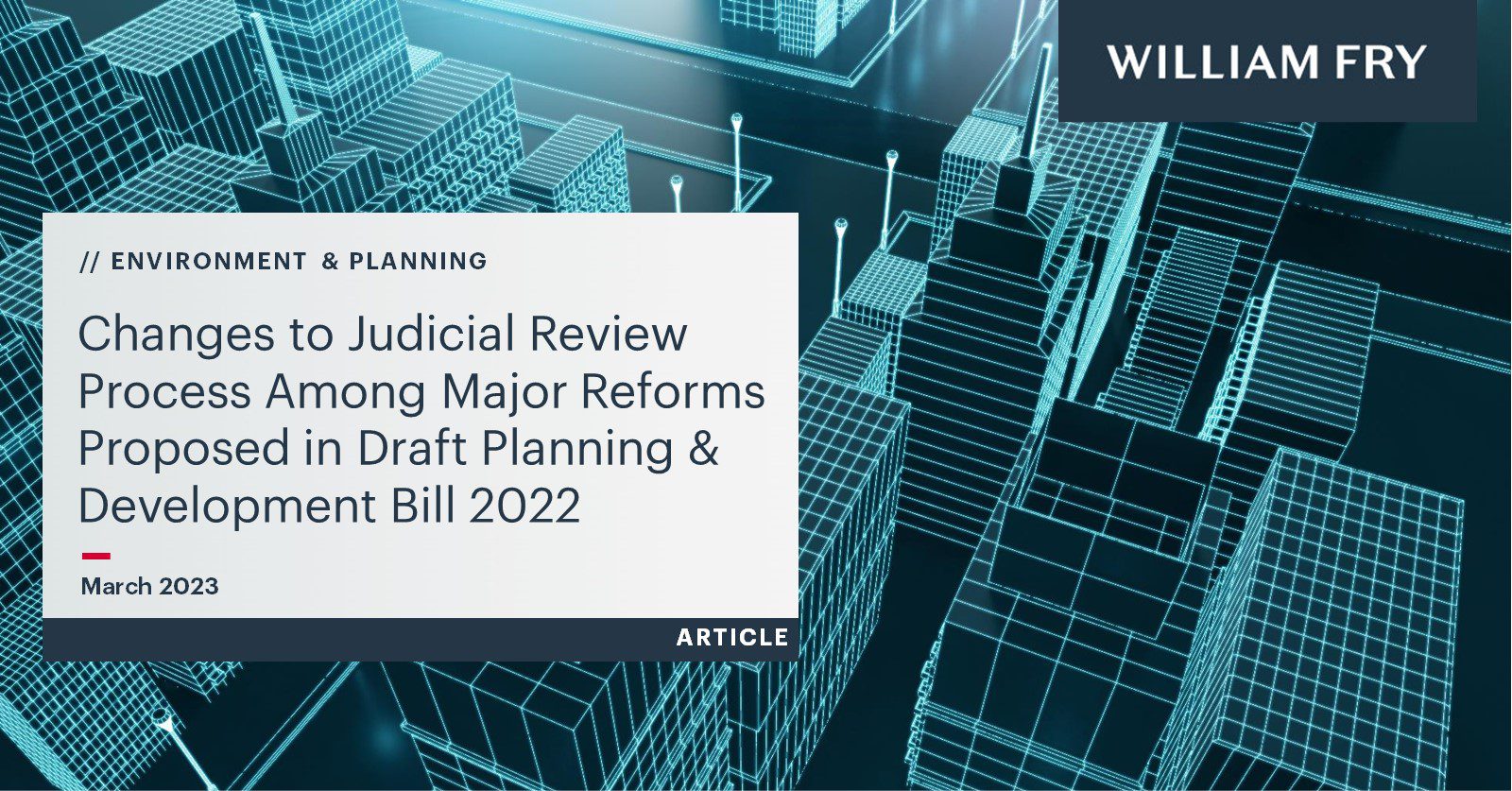The Government’s housing plan to 2030, Housing for All, committed to a review of the current planning system.
Following this review, led by the Office of the Attorney General, the Draft Planning and Development Bill 2022 (Draft Bill) was published. The Draft Bill contains a number of significant changes to the planning regime.
Among these changes is a re-branding of An Bord Pleanála (ABP) to An Coimisiún Pleanála with its decision-making and governing structures separated and a strengthened legal status of Ministerial Guidelines.
Judicial Review
The Draft Bill also introduces a number of changes to the Judicial Review (JR) process regarding planning decisions.
A person wishing to challenge a decision of ABP may do so by JR only. This is currently provided for under Sections 50, 50A and 50B of the Planning and Development Acts 2000 to 2022 (PDA).
The proposed changes contained in the Draft Bill include the following:
- Timelines for various steps in the JR process, including for pleadings, hearing of cases and delivery of judgments;
- Where ABP or the Planning Authority (PA) have made an error in fact or law in a planning decision, ABP or the PA (as appropriate) can correct this error and apply for a stay on the JR proceedings while doing so; and
- Increased clarity on the role of different parties accessing justice and update to rules on standing.
Standing
Environmental public interest litigation is gaining increased significance in Ireland, and the standing of environmental NGOs to bring such challenges has been the subject of much debate.
Section 249(10)(c) of the Draft Bill amends the provisions on standing to allow an applicant such as an environmental NGO to challenge a planning decision by way of JR, provided it fulfils certain criteria. The proposed section aims to make the standing requirements more stringent.
The provision requires an applicant to have “sufficient interest”, which can be satisfied by being directly or indirectly materially affected by the matters to which the application relates. Sufficient interest is not limited to an interest in land or a financial interest.
Where the JR relates to a decision on a development requiring an Environmental Impact Assessment or an Appropriate Assessment, an NGO or residents association will be regarded as having a “sufficient interest” if:
- it is a company that has existed for at least one year prior to the application;
- its constitution has as an object relating to the protection of the environment, and it has pursued such objects for at least one year;
- the company has no fewer than ten members;
- the company has passed a resolution authorising the bringing of the JR proceedings.
Costs
The Convention on Access to Information, Public Participation in Decision-making, and Access to Justice in Environmental Matters (Aarhus Convention) guarantees the right to information, participation, and access to justice in environmental matters.
The Irish courts have recognised that one of the objectives of the Aarhus Convention is to encourage public participation in the protection of the environment, and to achieve this, the costs incurred by litigants should not be prohibitively expensive (for example, see Kenny v An Bord Pleanála [2021] IESC 57).
A number of legislative reforms, including the Environment (Miscellaneous Provisions) Act 2011 amending section 50B of the PDA, introduced special costs protection rules designed to shield applicants from being held liable for costs if their application is unsuccessful. The Supreme Court recently held, in the case of Heather Hill Management Company CLG & McGoldrick v An Bord Pleanála, Burkeway Homes Limited and the Attorney General [2022] IESC 43, that the Protective Costs Order (PCO) available to applicants applies to all of the grounds in the proceedings challenging the validity of decisions to grant development consent.
Section 250 of the Draft Bill relates to costs in respect of certain proceedings. Section 250(1) provides that no order as to costs can be made relating to non-compliance with national or EU law relating to the environment unless the Court considers, for stated reasons, that the proceedings are frivolous, vexatious, or constitute an abuse of process.
Timelines
The Draft Bill introduces mandatory statutory timelines for all consent processes, including ABP decisions, aiming to bring increased certainty to the planning consent process.
The Draft Bill recognises that placeholders have been included in certain sections until technical issues are finalised.
Conclusion
The current planning legislative framework in Ireland was described by the Supreme Court as “an untidy patchwork confusing almost to the point of being impenetrable to the public” (An Taisce v McTigue Quarries [2018] IESC 54).
The Draft Bill represents a much-needed reform to the Irish planning system. The Draft Bill is undergoing pre-legislative scrutiny by the Joint Oireachtas Committee. Once complete it will be initiated before the Houses of the Oireachtas.
Contributed by Kate Abell



